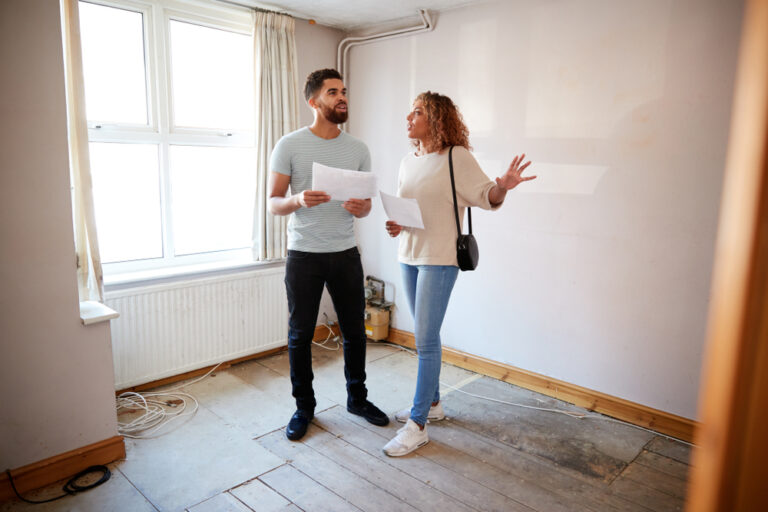Getting a first foot on to the property ladder can be difficult, especially for first-time buyers looking to purchase on their own.
That’s led to a rise in the number of first-time buyers pooling their buying power with friends.
But how do you go about buying a property with a friend and is the right thing to do?
We’ve got all the answers in this guide…
Can you buy a house with a friend?
It’s possible to buy a property with a friend, in the same as you may buy a home with a spouse or partner.
However, buying with a friend is more complicated and there are lots of things you’ll need to consider before you commit.
How many friends can buy a house together?
It’s possible to buy a property with multiple friends, rather than just one.
Up to four people can purchase a property as tenants in common, while mortgage lenders will often allow more than two people to apply for a joint mortgage.
Can you get a joint mortgage with a friend?
You can apply for a joint mortgage with a friend, or multiple friends in some cases.
Most lenders will accept a joint application from up to four people and each person will need to meet and pass their lending criteria and affordability checks.
However, they may only take the highest two salaries into account when working out what they may be prepared to lend you.
Under a joint mortgage agreement, all applicants are equally responsible for paying back the loan.
So, if one person is unable to pay their share, this falls on the others named on the agreement.
Is it a good idea to buy a property with a friend?
Before committing to buying a property with a friend, you’ll need to consider all the pros and cons of doing so:
| Buying with a friend pros | Buying with a friend cons |
| More affordable deposit and mortgage payments | Shared responsibility of homeownership can put strain on your relationship |
| Shared financial burden of bills and maintenance | Added complication should only one person wish to sell |
| More sociable than living alone | Changing circumstances of one friend can impact the other |
There’s a lot to think about and discuss if you and a friend are thinking of buying together, but these tips can help:
1. Think about your reasons for buying with a friend
If you’re thinking about buying a property with a friend, there’s a strong chance your primary reason for doing so is greater affordability.
After all, two salaries are better than one when it comes to both borrowing power and mortgage repayment affordability.
But you should also think about the dynamic between you and your friend and how this would work living in the same property.
Do you actually want to live together?
2. Discuss your future plans
Talk to you friend about your plans for the future and how these could affect your relationship as property owners:
- What would happen if one or both of you met a new partner?
- Would you be happy if your friend’s partner moved in, or would they have to move out?
- If they did move out, would you be able to buy their share of the property yourself, or would you have to sell?
- Are your jobs secure or are either of you likely to be changing jobs in the short term?
3. Speak to a mortgage advisor
Affordability is often the issue that stops a property purchase with a friend in its tracks.
So, always speak to a mortgage advisor first to assess your options and borrowing ability.
Your mortgage advisor will be able to give you an idea of what you may be able to borrow together and may have access to mortgage products and rates you won’t find elsewhere.
4. Be open and honest about your financial situations
Buying a property with a friend through a joint mortgage is a huge financial commitment for both of you.
And one person’s financial issues can become the other’s, too, if you’re not honest with each other from day one.
Run through your financial situations together and make sure you’re both up front about debt and any other issues that could affect your borrowing ability.
5. Agree how you’ll split all costs
As well as the purchase price, there are a whole host of other costs you’ll encounter when buying a property with a friend, including:
- Possible stamp duty
- Legal fees
- Valuation and survey fees
- Mortgage arrangement and product fees
- Removals costs
Agree how you’ll pay for these and how much each of you will pay before you start making offers on properties.
6. Buy as tenants in common
When you buy a property with another person, you can either buy as joint tenants or tenants in common.
Joint tenant purchases are usually completed by couples, with a ‘tenants in common’ agreement better for other joint buyers such as friends.
Joint tenants own equal shares in the property and if one were to pass away, their share automatically passes to the other person.
Tenants in common, however, don’t have to own equal shares.
So, if you’re putting in more of a deposit than your friend, or paying a greater share of the mortgage, you could both agree that you own a larger share of the property.
Tenants in common can also decide what to do with their share should they pass away, rather than the share automatically passing to the other owner as it would under a joint tenancy agreement.
7. Make sure everything is legally sound
The best way to negate any disputes with your friend when buying together is to have a co-habitation agreement or deed of trust drawn up by a solicitor.
This outlines all your individual responsibilities, each person’s ownership rights, and what will happen to your property in certain circumstances.
A cohabitation agreement or deed of trust usually includes details on:
- The amount of deposit paid by each person
- The percentage of the property each person owns
- How much equity each person would be entitled to in the event of a sale
- The purchase costs and fees paid by each person
- The split of the mortgage payments between each person
- How mortgage payments are made
- How costs, bills and insurance premiums are paid and who pays what
- How items such as furniture would be divided up in the event of a sale
- What happens if one person is unable to meet their financial obligations
- What happens if one person were to pass away
You could also consider drawing up a Will, stipulating what happens to your share of the property and anything you own in the event of your death.
8. Set up a joint account
Your mortgage lender may insist you set up a joint account to pay back your loan – but it can be a good idea to do this anyway.
That way, both of you can pay your agreed amount into the joint account each month ahead of your mortgage repayment date.
You could also consider using this account to pay bills, once you’ve agreed on how these will be split between you and use the account to build up a ‘fighting fund’ to cover any property maintenance costs.








